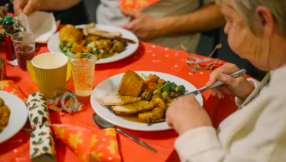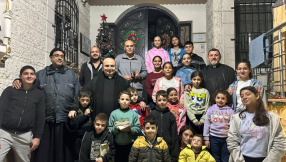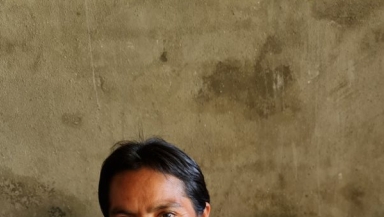
Mothering Sunday is a time for thanking mothers and mother-figures for all they do in our lives, as well as remembering all mothers who have lost children, all children who have lost mothers, and all those who long to be mothers but cannot.
Three mothers who are separated by a distance of over 15,000 kilometres – from the rugged mountains of southwest rural Mexico to a small town in northeast Nigeria to the city streets of Roorkee in northern India – have something in common.
Their names are Juana Custodio Bernabe, Rebecca Sharibu and P Sadhana Portor, and each of them has been impacted by violations of freedom of religion or belief (FoRB), including circumstances where their own child is the victim.
On Mother's Day 2022, we recognise their strength, and honour their bravery and resilience in the face of hostility and persecution.
Juana Custodio Bernabe, Mexico
Juana Custodio Bernabe lives in an indigenous community in El Mesón Zapote, Ayutla de los Libres Municipality, Guerrero State. She speaks Mixtec – an indigenous language.
Almost every week Juana and her family are verbally abused by people from the religious majority community as they undertake the two-hour walk from El Mesón Zapote to worship in their Protestant church in Coacoyulichán, Cuautepec Municipality.
Sadly, this is not uncommon in Mexico, where violations of FoRB are widespread in many indigenous communities governed under traditional law. In many of these communities, a religious majority attempts to enforce religious uniformity. Threats, illegal fines, arbitrary detention, the withdrawal of basic services and forced displacement are regularly reported to CSW by families who convert away from the majority religion and do not wish to participate in its associated activities. The Mexican government has been reluctant to proactively uphold the right to freedom of religion or belief for these communities, resulting in a deep-rooted culture of religious intolerance and impunity.
In November 2020, the commissioner of El Mesón Zapote encouraged residents to put their cows on land owned by Juana and her family, to eat and trample on their crops as a punishment for converting away from the majority religion. On one night in particular, Juana's family lost the eight kilograms of bean seeds they had planted on four hectares of land, the equivalent of ten months' worth of food and income.
Juana's situation is exacerbated by the denial of government benefit programmes. Her 15-year-old daughter has a disability which means that she cannot attend school. The family is entitled to financial support through the government's Pension Programme for the Welfare of People with Disabilities, which is delivered via the village commissariat - but the commissioner, Isidoro Carpio, has refused to pass on the money, which is against the rules of the benefit programme.
In summer 2020, Mr Carpio sent a Roman Catholic catechist to Juana's home stating that he would only sign and approve the document for her daughter's financial support if they returned to the majority religion, which is Roman Catholicism. Juana and her family refused. As a result, they continue to live without the financial support to which they are entitled.
Juana told CSW that she now lives under constant stress and exhaustion, as she is her daughter's primary caregiver. She lives with the financial and emotional burden of worrying both about her daughter and about her own ability to properly feed her family due to the denial of the financial support.
P Sadhana Portor, India
A culture of impunity is also a problem in India, where hate speech by far-right Hindu nationalist groups has fuelled hostility towards religious minorities for many years. Officials of the National Democratic Allience-led Hindu nationalist Bharatiya Janata Party (BJP) are known to permit the spread of religious hatred, doing little to prevent and investigate attacks on members of minority faith communities.
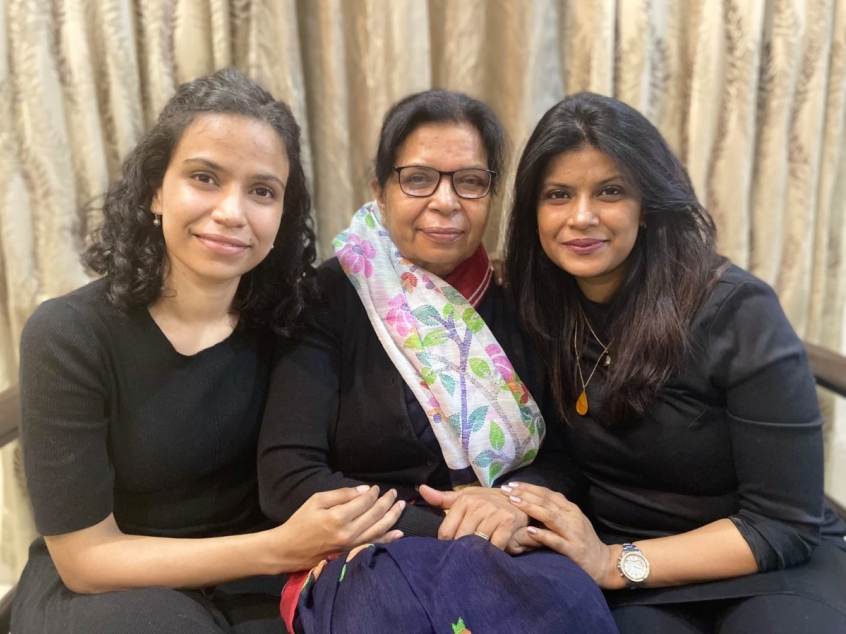
Since her husband passed away due to COVID-19 in 2020, P Sadhana Portor, who lives in Roorkee, Uttarakhand state, India, has been leading the House of Prayer church with her daughters, Eva and Pearl Lance.
On Sunday 3 October 2021 a group of around 12 Christians who had gathered at the House of Prayer church were attacked by a mob of almost 300 people. The mob unlawfully entered the premises and started chanting "Vande Mataram," "Jai Shri Ram" and "Bharat Mata Ki Jai" (which means "Praise to the motherland," "Hail Lord Ram/Victory to Lord Ram" and "Hail India").
Eva tried to call the police but could not connect. She asked the mob to sit down but to no avail.
The group destroyed CCTV cameras, lights, fans, musical instruments and furniture. Several church members were attacked, including a man who was beaten until semi-unconscious.
Two days prior to the attack, Eva had contacted the police after she and her mother realised they were being followed by a car. It is thought that right-wing fundamentalists targeted the church of a widowed mother and her daughters knowing that they were particularly vulnerable after the death of their husband and father.
Eva said: "The police walked in so passively, despite the fact that I had been asking for security for two days. It was so obvious that the whole rampage was pre-planned and the police were involved. The mob knew exactly where the cameras were, they were able to gather so many people together. It was so well thought out."
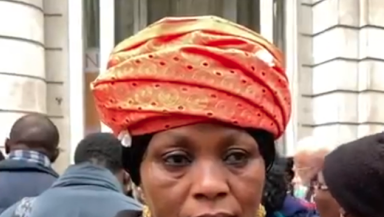
Rebecca Sharibu: "Nothing is impossible with God. Someday she will be free."
Rebecca Sharibu lives in Yobe state, north-eastern Nigeria.
On 19 February 2018 her 15-year-old daughter, Leah, was among 110 girls abducted from the Government Girls Science and Technical College in Dapchi by members of the Islamic State West Africa Province (ISWAP) terrorist group.
On 21 March 2018, following negotiations with the government, ISWAP returned the surviving girls to Dapchi. But Leah, the sole Christian in the group, was not among them.
Leah remained in captivity because of her refusal to renounce her faith and convert. Her school friends said that they begged her to feign conversion, but Leah replied that she could not live with herself if she did so. As they left for home Leah asked them to tell her mother to pray for the will of God to be done in her life.
Over four years later, Rebecca still awaits her daughter's return, despite a promise made to her personally by the Nigerian president in 2018 that his administration would secure Leah's release.
Leah's tragic story is sadly not an uncommon one. While she was abducted by one of the most dangerous terrorist organisations in the world, in most of Nigeria's Shari'a states Christian schoolgirls are frequently abducted by locals, often in collusion with traditional rulers, Shari'a commissions or other religious organisations. Local police are reluctant to intervene in such cases, often telling parents to go home and forget about their daughters.
In an interview with CSW in November 2021, Rebecca said: "if I could see [Leah], I would tell her how we praise her decision and also let her know that we are still praying for her and, some day, she will be back home. [...] We are still praying for her; the world is praying for her. Nothing is impossible with God. Someday she will be free."
Many Mothers, Many Countries, Many Stories
This Mother's Day, as we give thanks for the mothers and mother-figures in our own lives, we also stand in solidarity with Juana Custodio Bernabe, Rebecca Sharibu and P Sadhana Portor, and their children and call ever more strongly for justice to flow, from Mexico to Nigeria to India and beyond.
Freya Vickery is an intern at Christian Solidarity Worldwide.












